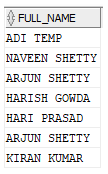| ☰ See All Chapters |
Oracle CONCAT Function
Oracle CONCAT function adds two or more arguments together. In Oracle this function is equivalent to the concatenation operator (||).
Oracle CONCAT Function Syntax
CONCAT(arguement1, arguement2) |
arguement1, arguement2: These arguments can be an expression or a direct value or a value from a column of any type. If all arguments are non-binary strings, the result is a non-binary string. If the arguments include any binary strings, the result is a binary string. If a numeric argument is given then it is converted to its equivalent non-binary string form. To concat more than two strings, you have to concat the concated string as below.
CONCAT(CONCAT(arguement1, arguement2), arguement3) |
Oracle CONCAT Function Example
Creating table for demonstrating CONCAT Function
CREATE TABLE NAME ( FNAME VARCHAR(10 ) NOT NULL, LNAME VARCHAR(10 ) ); Insert into NAME (FNAME, LNAME) Values ('ADI', 'TEMP'); Insert into NAME (FNAME, LNAME) Values ('NAVEEN', 'SHETTY'); Insert into NAME (FNAME, LNAME) Values ('ARJUN', 'SHETTY'); Insert into NAME (FNAME, LNAME) Values ('HARISH', 'GOWDA'); Insert into NAME (FNAME, LNAME) Values ('HARI', 'PRASAD'); Insert into NAME (FNAME, LNAME) Values ('ARJUN', 'SHETTY'); Insert into NAME (FNAME, LNAME) Values ('KIRAN', 'KUMAR'); COMMIT; |
Example 1
SELECT CONCAT(CONCAT(FNAME, ' '), LNAME) AS FULL_NAME FROM NAME |

Example 2
SELECT CONCAT(FNAME, 'Hello') AS FULL_NAME FROM NAME; |

All Chapters

